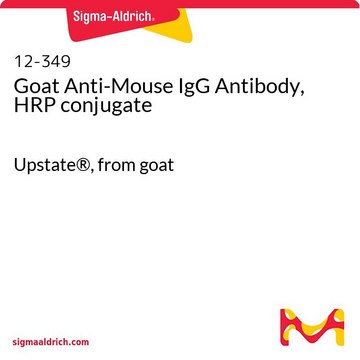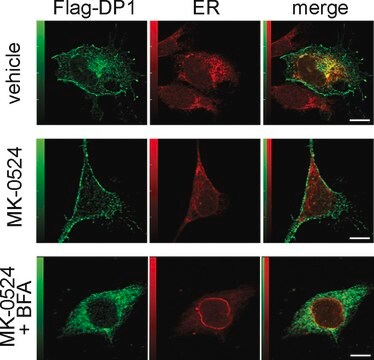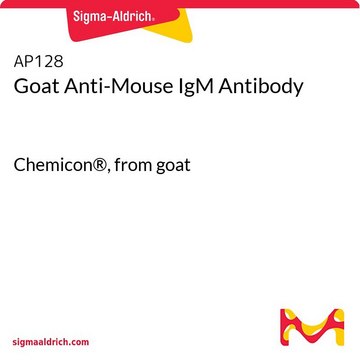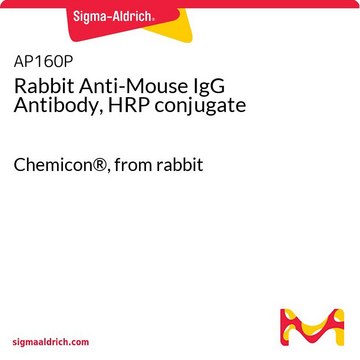AP160
Rabbit Anti-Mouse IgG Antibody
2.4 mg/mL, Chemicon®
Synonim(y):
Przeciwciało IgG
Zaloguj sięWyświetlanie cen organizacyjnych i kontraktowych
About This Item
Kod UNSPSC:
12352203
eCl@ss:
32160702
NACRES:
NA.46
Polecane produkty
pochodzenie biologiczne
rabbit
Poziom jakości
białko sprzężone
unconjugated
forma przeciwciała
purified immunoglobulin
klon
polyclonal
reaktywność gatunkowa
mouse
producent / nazwa handlowa
Chemicon®
stężenie
2.4 mg/mL
metody
ELISA: suitable
immunoprecipitation (IP): suitable
western blot: suitable
Warunki transportu
wet ice
docelowa modyfikacja potranslacyjna
unmodified
Powiązane kategorie
Specyficzność
Reacts with Mouse IgG gamma chain, as well as the light chains from all Mouse immunoglobulin classes. Monospecific on IEP against whole Mouse Serum.
Immunogen
Highly purified Mouse IgG isolated from pooled normal Mouse Serum.
Zastosowanie
Detect Mouse IgG using this Rabbit anti-Mouse IgG Antibody validated for use in ELISA, IP & WB.
Research Category
Secondary & Control Antibodies
Secondary & Control Antibodies
Research Sub Category
Whole Immunoglobulin Secondary Antibodies
Whole Immunoglobulin Secondary Antibodies
Przechowywanie i stabilność
Store at +2-8°C. Do not freeze.
Informacje prawne
CHEMICON is a registered trademark of Merck KGaA, Darmstadt, Germany
Oświadczenie o zrzeczeniu się odpowiedzialności
Unless otherwise stated in our catalog or other company documentation accompanying the product(s), our products are intended for research use only and are not to be used for any other purpose, which includes but is not limited to, unauthorized commercial uses, in vitro diagnostic uses, ex vivo or in vivo therapeutic uses or any type of consumption or application to humans or animals.
Ta strona może zawierać tekst przetłumaczony maszynowo.
Kod klasy składowania
12 - Non Combustible Liquids
Klasa zagrożenia wodnego (WGK)
nwg
Temperatura zapłonu (°F)
Not applicable
Temperatura zapłonu (°C)
Not applicable
Certyfikaty analizy (CoA)
Poszukaj Certyfikaty analizy (CoA), wpisując numer partii/serii produktów. Numery serii i partii można znaleźć na etykiecie produktu po słowach „seria” lub „partia”.
Masz już ten produkt?
Dokumenty związane z niedawno zakupionymi produktami zostały zamieszczone w Bibliotece dokumentów.
Collateral projection from the locus coeruleus to whisker-related sensory and motor brain regions of the rat.
Sat-Byol Lee,Suk K Beak,Seung H Park,Barry D Waterhouse,Hyun S Lee
The Journal of Comparative Neurology null
Immunohistochemical localization of DARPP-32 in the brain and spinal cord of anuran amphibians and its relation with the catecholaminergic system.
Jesus M Lopez,Ruth Morona,Agustin Gonzalez
Journal of Chemical Neuroanatomy null
Kari Vaahtomeri et al.
Journal of cell science, 121(Pt 21), 3531-3540 (2008-10-09)
Inactivating mutations of the tumor-suppressor kinase gene LKB1 underlie Peutz-Jeghers syndrome (PJS), which is characterized by gastrointestinal hamartomatous polyps with a prominent smooth-muscle and stromal component. Recently, it was noted that PJS-type polyps develop in mice in which Lkb1 deletion
Yao-Ming Wu et al.
Cell transplantation, 19(9), 1169-1180 (2010-04-24)
Hepatocyte transplantation (Tx) holds promise for curing genetic liver diseases. However, a limited number of donor hepatocytes can be transplanted into the host liver. Recipient preconditioning and donor cell engineering are under investigation to improve cell engraftment. In theory, genetically
Nasz zespół naukowców ma doświadczenie we wszystkich obszarach badań, w tym w naukach przyrodniczych, materiałoznawstwie, syntezie chemicznej, chromatografii, analityce i wielu innych dziedzinach.
Skontaktuj się z zespołem ds. pomocy technicznej








